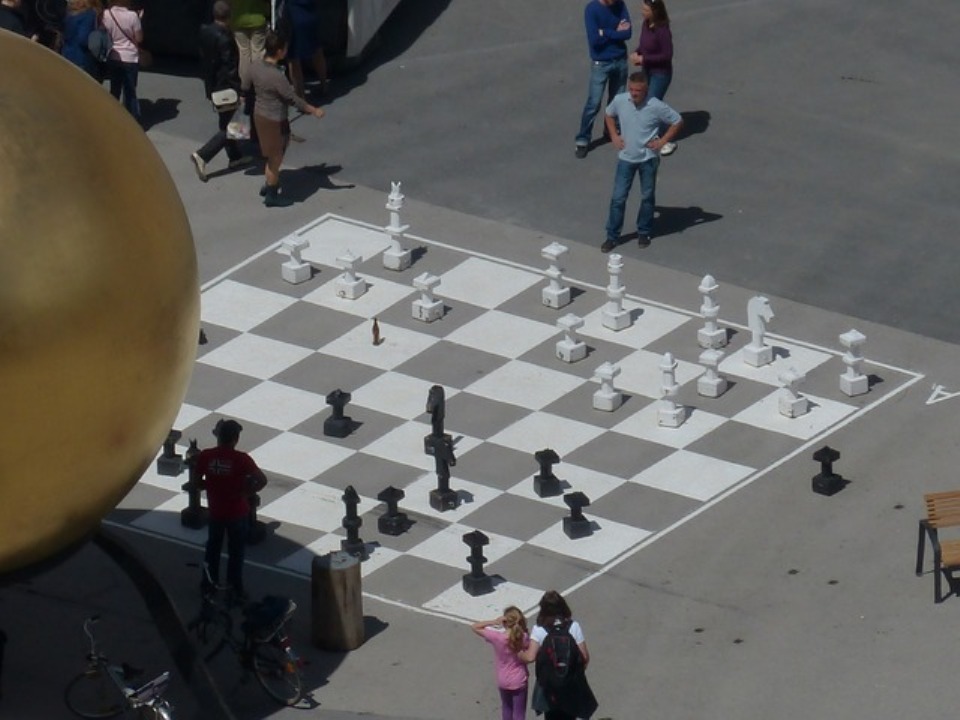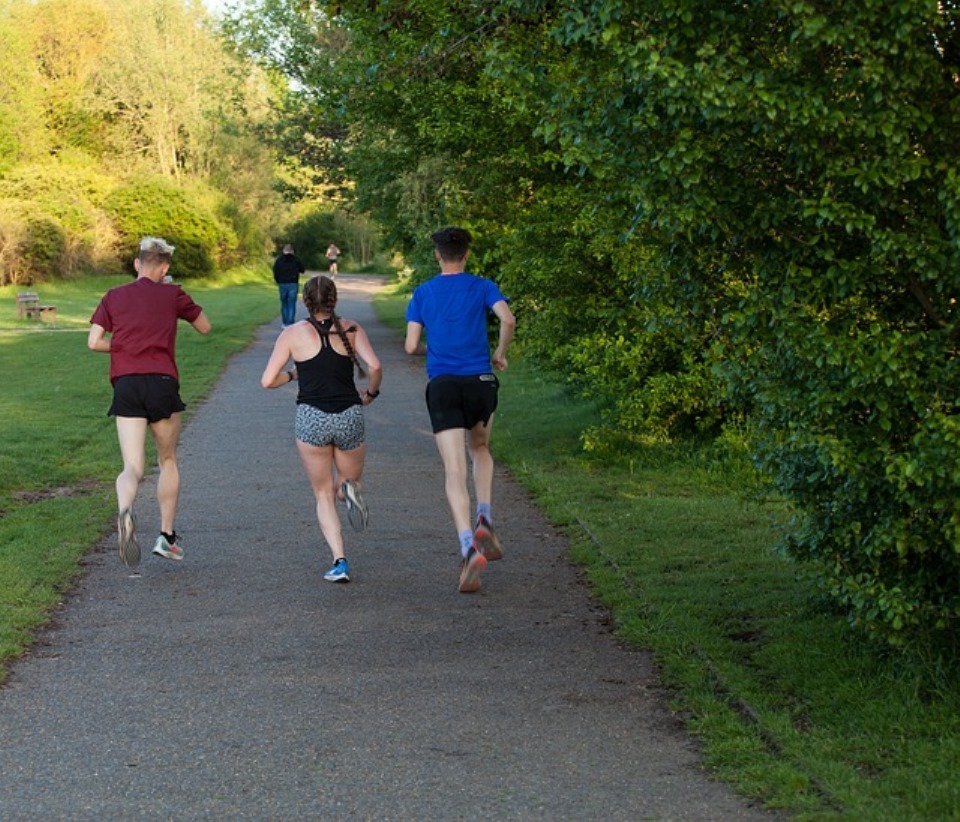
What do you do on Mondays? I learn Spanish with P2T – ¿Qué haces los lunes? (Yo) aprendo español con P2T
Some real examples of how to use the “Simple Present Tense” when talking about habits and routines, among many other uses. – Te mostramos algunos ejemplos del “Presente” para expresar acciones que suceden a diario, es decir, nuestros hábitos y rutinas; entre multitud de otros usos.
If the videos are too quick for you, use the playback speed and captions buttons for slow motion and subtitles. It is advisable that you listen to Spanish people talking. If you are a complete beginner, join our Spanish Lessons and contact Susana for more information +34 661 74 36 45.
This tense is also used to describe unchanging situations, general truths, schedules and fixed arrangements and for giving instructions, ordering in restaurant and stores, etc…. – Además, este tiempo se usa para hablar de hechos generales o relacionados con la naturaleza; situaciones, emociones o deseos permanentes; horarios y eventos programados (presentes o futuros) y para dar instrucciones, pedir en un restaurante, etc….
1. Conjugación – Conjugation, how do we form it?
1.1. Verbos regulares – Regular verbs
INFINITIVO=RAIZ+terminación (HABLAR=HABL+ar) / INFINITIVE=STEEM+ending (To speak)
To conjugate a verb in Simple Present, remove the infinitive ending (-ar, -er, -ir) and add the ending that matches the subject from the table below. – Se forma con la raíz del verbo (quitando las dos últimas letras) y añadiendo las terminaciones de presente.
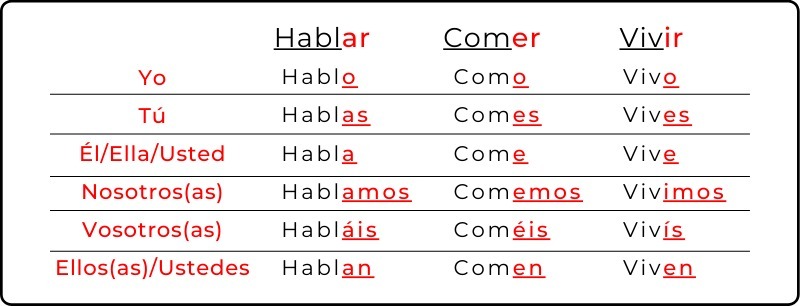
1.2. Verbos irregulares – Irregular verbs
1.2.1. Irregular “Yo” Forms
-Verbs with spelling changes in the “Yo” form
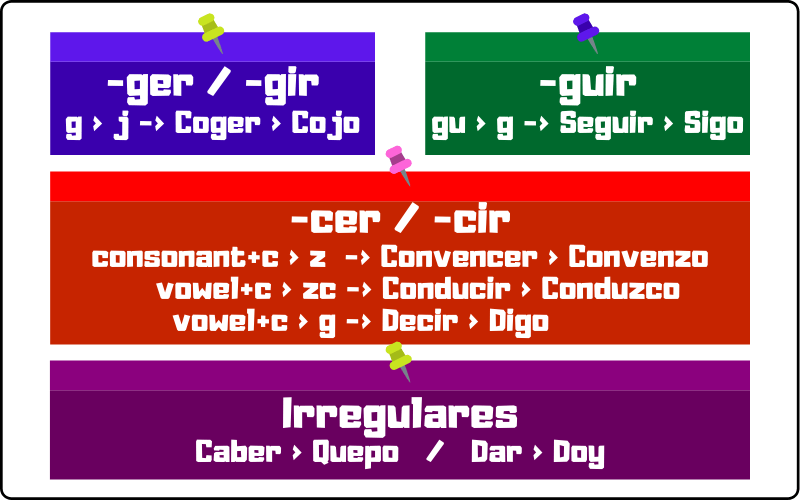
Group 1: -ger and -gir Verbs g changes to a j: coger (to catch/grab)-yo cojo, escoger (to choose)-yo ___________ (write your answer at the end of the page)
Group 2: -guir Verbs the gu changes to a g (u is dropped): seguir (to follow)-yo sigo, conseguir (to achieve)-yo ______
Group 3: -cer and -cir Verbs
- If the letter that comes before -cer or -cir is a consonant, the c changes to a z: convencer (to convince)-yo convenzo, ejercer (to exert)-yo ______________
- If the letter that comes before -cer or -cir is a vowel, a z is added before the c> -zc : conducir (to drive) – yo conduzco, conocer (to know)-yo ____________
- Exception: -go Verbs do not follow the c > -zc rule. Instead, the c changes to a g: decir (to say/tell)-yo digo, hacer (to do/make)–yo __________.
- Other verbs also follow this g rule: oír (to hear)-yo oigo, tener (to have)-yo ____________, poner (to put)-yo _______.
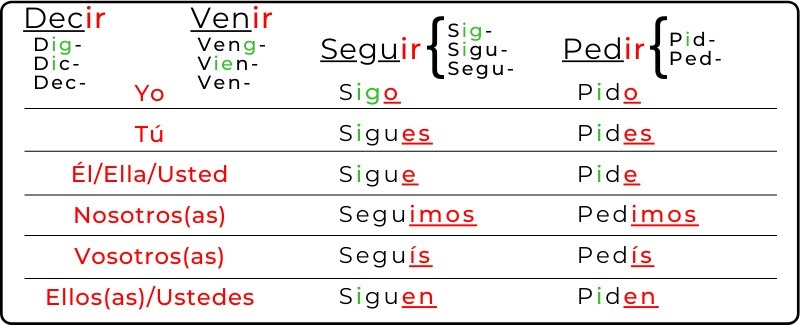
-Verbs with Irregular “Yo” forms
The following verbs have irregular yo forms. The other present tense forms of these verbs follow the patterns for regular -ar, -er, and -ir verbs. Caber (to fit)-yo quepo, dar (to give)-yo doy, saber (to know)-sé
1.2.2. Irregular in all forms, except for “Nosotros and Vosotros “
Stem-changing verbs (also called shoe verbs, or boot verbs) in the present tense use the same endings as regular -ar, -er, and -ir verbs when conjugated but undergo a vowel change in the last syllable of the stem. Present tense stem changes do not apply to “Nosotros” and “Vosotros” forms. These two forms maintain the form of the infinitive stem.

Group 1: e > ie changes: This type of stem change affects the largest number of verbs. For verbs in this group, the e in the last syllable of the stem changes to ie: recomendar (to recommend) – to recomiendo, nosotros recomendamos, querer (to want)-yo ____________, nosotros ______.
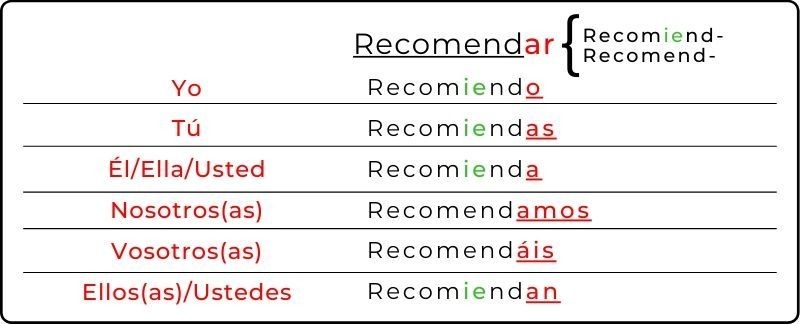
Group 2: o > ue changes: For verbs in this group, the o in the last syllable of the stem changes to ue: poder (to be able)-yo puedo, nosotros podemos, dormir (to sleep)- yo ___________, nosotros __________
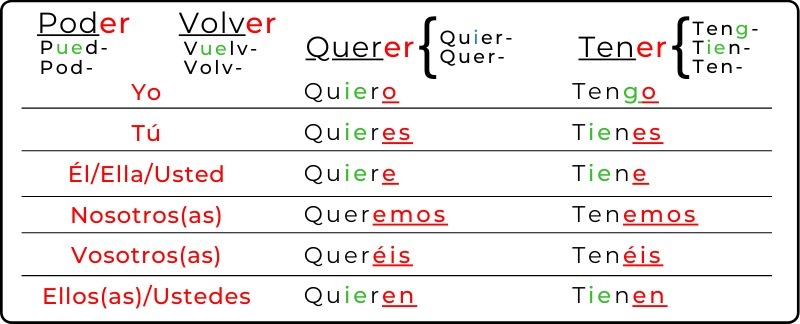
Group 3: e > i changes: For verbs in this group, the e in the last syllable of the stem changes to i: pedir (to order)- yo pido, nosotros pedimos, vestir (to get dressed)- yo ______

Group 4: i > ie changes: There are only two commonly-used verbs in this group: adquirir (to acquire)-yo adquiero, nosotros adquirimos and inquirir (to inquire)-yo _______, nosotros _____________________.
Group 5: u > ue changes: There is only one commonly-used verb in this group: jugar(to play)-yo juego, nosotros jugamos.
Group 6: –uir Verbs Rule: Between vowels, an unstressed i always changes to a y. In these verbs, destruir (to destroy) yo destruyo, nosotros destruimos, incluir (to include) yo ___________, nosotros ____________

1.2.3. All irregular forms: Estar, Ser, Ir and Haber
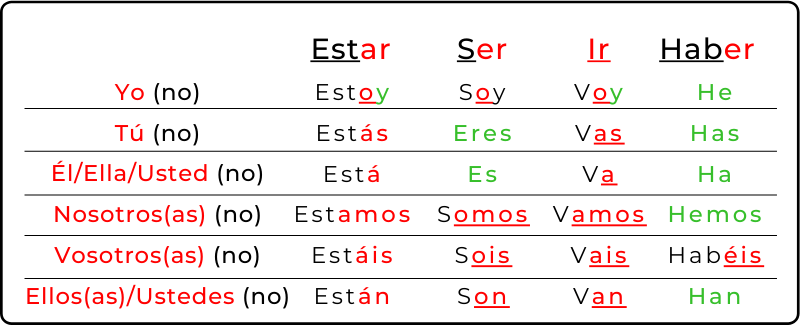
2. Usos – when do we use it?
2.1. To talk about habitual actions or routines
Los domingos me levanto a las doce. (ENLACE A VERBOS REFLEXIVOS)
I get up at twelve on Sundays. (Click here to go to reflexive verbs)
Cada mañana, ni hijo estudia hasta a las nueve y media.
My son studies until half past nine every morning.
2.2. To talk about general truths
Uno más uno son dos.
One plus one is two.
2.3. To talk about facts, opinions, or proverbs
Más sabe el diablo por viejo que por diablo.
Wisdom comes with age.
2.4. To talk about unchanging situations
(Yo) vivo en Murcia desde hace tres años.
I live in Murcia since three years ago. (I have been living in Murcia since three years ago.)
2.5. To talk about emotions and wishes
(Yo) quiero bailar todas las noches esta semana.
I want to dance all nights this week.
2.6. To give instructions or directions
Primero, andas diez metros y entonces giras a la derecha.
First you walk for ten meters, and then you turn right.
2.7. To talk about emotions and wishes
¿Cómo estás? Estoy muy cansado/a.
How are you? I am very tired.
2.8. To express fixed arrangements, present or future – Para expresar acciones programadas en el presente o en el futuro:
El examen empieza a las ocho de la mañana.
The exam starts at 8 am .
2.9. To talk about future events which are part of a fixed timetable or programme – Para hablar sobre eventos futuros cuando son parte de un horario o un programa de actividades:
El tren sale a las siete de la tarde.
The trains leaves at 7 pm.
2.10. To talk about nature or natural phenomenon – Para hablar de fenómenos de la naturaleza
¿Por dónde sale el sol?
Which direction does the sun rise?
2.11. To talk about cause-effect situations (zero conditional)
Si llueve, la fiesta termina.
If it rains, the party is over.
2.12. To order something in a restaurant or store – Para pedir algo en un restaurante o tienda
¿Nos/me trae un tenedor, por favor? ¿Nos/me puede traer un tenedor, por favor?
Would you bring me a fork, please? / Could you bring me a fork, please?
3. Diferencias con el inglés – Differences with English
3.1. It CAN BE used to express actions happening now.
The simple present CAN BE USED to express actions happening now. In general, we ask using the simple present and we answer using the present continuous. – A diferencia del inglés, tanto el presente como el presente continuo se pueden utilizar para hablar de lo que está ocurriendo en este momento.
¿Qué haces? Estoy limpiando el salón. Limpio el salón.
What are you doing? I am cleaning the living room.
3.2 It CAN BE used to express future actions
The simple present CAN BE used instead of simple future to talk about future events that are certain. – Podemos usar el presente simple en vez del future simple para hablar de eventos futuros que son ciertos.
Te veo mañana en el hospital.
I’ll see you tomorrow at the hospital
3.3 It CAN NOT BE used to express future actions after when, before, as soon as, until
In Spanish, the simple present CAN NOT BE USED to express future time, after some conjunctions such us after, when, before, as soon as, until. – El presente NO SE USA para referirse al future después de DESPUÉS, CUANDO, ANTES DE QUE, TAN PRONTO COMO, en estos casos usamos el Presente de Subjuntivo.
Él te lo dará cuando vengas el próximo sábado.
He’ll give it to you when you come next Saturday.
Veré a María antes de que se vaya.
I will see Maria before she leaves.
4. Marcadores temporales – time expressions
-Cada día, semana, mes, año. Los lunes. Por la mañana, por la tarde, por la noche. Durante la semana. Los fines de semana. – Every day, week, month, year. On Monday. In the morning, in the afternoon, in the evening or at night. During the week. At weekends.
-En enero, en febrero….En primavera, en verano, en otoño, en invierno. Al amanecer, al atardecer, al anochecer, etc… – In January, in February …. In spring, in summer, in autumn, in winter. At dawn, at sunset, at dusk, etc.
-Una vez al año, dos veces al año. – Once a year, twice a year.
Adverbios de frecuencia – frecuency adverbs
Siempre-always, casi siempre-usually, normalmente-normally, por lo general, generalmente-generally, a menudo-often, frecuentemente-frequently, a veces-algunas veces-sometimes, de vez en cuando-occasionally, casi nunca-pocas veces-seldom, rara vez-rarely, nunca-never, ahora-now ( we use “now” when we are companing what is going on at this point of our lives with our past “before” – Usamos “ahora” para comparar nuestra vida actual con nuestra vida en el pasado “antes”)
In the questions, we write them at the end of the sentence, while in the answers we do it at the beginning of the sentence – En las preguntas suelen aparecer al final de la frase, mientras que en las respuestas aparecen al principio de la frase.
5. Ejercicios – Exercises
At the end of the page there is a LEAVE A REPLY section to send us your answers to this exercise: Ask a question for each one of the pictures using a time expression or an advert of frecuency. Then reply to your questions. *Note: there is a list of verbs under the pictures. – Al final de la página hay un apartado para enviarnos tus respuestas a este ejercicio “LEAVE A REPLY”: Haz una pregunta para cada una de las fotografías usando una expresión de tiempo o un adverbio de frecuencia y respóndelas. *Nota: hay un listado de verbos a continuación de las fotos.
- ¿Qué hace (él/ella) en verano? Él/ella escala los lunes y corre los viernes…. porque….
- ¿Qué hacen (ellos/ellas) los fines de semana? Ellos/ellas montan en bici/hacen ciclismo…. porque…
- What does he/she do in the summer? He/she climbs on Mondays and go running on Fridays …. because….
- What do they do at weekends? They ride a bike/ go out cycling… because….
Nota: Los siguientes verbos te pueden ayudar a completar las frases: jugar al ajedrez / fumar / comer / pasear / correr / escalar / escuchar música / dormir / montar en bici-hacer ciclismo / cocinar-preparar la cena / conducir / leer – Note: The following verbs can help you complete the sentences: TO… play chess / smoke / eat / walk / run / climb / listen to music / sleep / ride a bicycle- go cycling / cook / drive / read
- Los fines de semana, ellos…
- En verano, él…
- Normalmente, ellos…
- Durante la semana, él…
- Ella siempre come espaguetis con salsa boloñesa porque le encanta la pasta.
- A veces, ella…
- Ellos nunca…….cuando llueve porque….
- Algunos días, ella…
- Todos los fines de semana, ellos…
- Ella … durante la semana
- Casi nunca, (ella)… delante de sus padres porque…
- Todas las tardes, ellos…
And remember!! Practice makes perfect
Come to practise with Spanish native speakers in our >> Off The Cuff Talks! << be brave and ask them ¿Qué estás haciendo?
Did you find it useful? Then, please… FEEL FREE TO SHARE IT!
Do you have any doubts or even a contribution? Please fill out the form at the bottom, and we will get back to you asap⏬
Join our Spanish lessons in Torre de la Horadada, San Javier, Mar Menor Golf Resort and Sucina (Casas Blancas)
This is just a small example of what you can learn. Get the support of the best Spanish Tutor in the area, Susana Romero, and enjoy learning Conversational Spanish.







